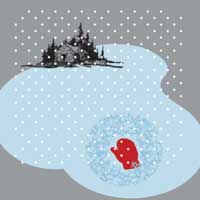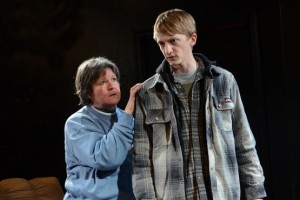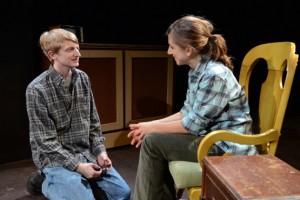
 Highly Recommended *****Before seeing a show, critics are given a press folder. It can contain a lot, but usually it has information about the play, theater company, and the production the critic is there to review. The Side Project Theater’s press release says this of Mary Hamilton’s play “We Three:” “a little girl has gone missing and the whole town searches for answers. But are they asking the right questions? Who exactly is Dustin? What does Daisy really want? And what did Grace see, or not see?” If a theater goer is expecting answers to any of these questions, they will be disappointed. In no way is this story about what happened to the little girl, who Dustin is, what Grace saw, or what Daisy wants. In the hands of director Josh Sobel, it is instead a gorgeous and elegiac meditation on pain in all its permutations, and (as the playwright sees it) our utter inability and failure both to comfort and be comforted by our friends and neighbors whose own humanity (especially pain and fear) gets in the way, and by those people entrusted by formal social apparatuses to help us, like police and doctor’s, who have stripped themselves of their most humane qualities replacing them with a cold professionalism that ensures that they will look at things scientifically (in terms of probability, tests, and logical explanation).
Highly Recommended *****Before seeing a show, critics are given a press folder. It can contain a lot, but usually it has information about the play, theater company, and the production the critic is there to review. The Side Project Theater’s press release says this of Mary Hamilton’s play “We Three:” “a little girl has gone missing and the whole town searches for answers. But are they asking the right questions? Who exactly is Dustin? What does Daisy really want? And what did Grace see, or not see?” If a theater goer is expecting answers to any of these questions, they will be disappointed. In no way is this story about what happened to the little girl, who Dustin is, what Grace saw, or what Daisy wants. In the hands of director Josh Sobel, it is instead a gorgeous and elegiac meditation on pain in all its permutations, and (as the playwright sees it) our utter inability and failure both to comfort and be comforted by our friends and neighbors whose own humanity (especially pain and fear) gets in the way, and by those people entrusted by formal social apparatuses to help us, like police and doctor’s, who have stripped themselves of their most humane qualities replacing them with a cold professionalism that ensures that they will look at things scientifically (in terms of probability, tests, and logical explanation).
In my mind, the key to understanding the play is the eponymous Christmas Hymn (this play is set in February: nowhere near Christmas or even the Feast of the Epiphany) which Grace (Anne James) hums for comfort: “We Three Kings of Orient are, bearing gifts we traverse a far.” Gifts by each of the three main characters in this play are sought and denied, offered and rejected, given and inefficacious. They are things as tiny as a meal, biscuit, or even a piece of soap. As the play opens, Dustin (Adam Shalzi), a lonely and awkward young man, is making dinner for his only friend Daisy (Stevie Chaddock) whom he loves and on whom he has a slight crush. She complains that he keeps ruining her eggs, mocks his dirty nails (he has a green thumb and works as a gardener even in dead winter), and tells him that he will never find a girl.
Throughout the play, he repeatedly asks her to say the night in the spare bedroom; she refuses, saying she fails to understand what that could do to alleviate Dustin’s loneliness, and seems frightened by Dustin’s peculiar mannerisms and his infatuation with her. But Daisy has another reason for being terrified: she suffers on and off from an intense lower-abdominal pain which she believes is something inside her stomach trying to kill her. The doctor (Andy Luther) cannot find anything wrong with her physically, but we find out just how completely her identity is shattered when he asks her to tell him about herself during an exam, and she offers a haunting and laconic refrain of completely incidental information which she will desperately repeat throughout the play, “I am five foot two, I work in a store that sells soap, I am allergic to nuts, mold, and grass shavings in July.”
Under the direction of Josh Sobel, three extremely powerful performances help carry this mysterious script and draw out the aforementioned meaning. The technical aspects of the play, as usual at The Side Project, are superb: lighting (Ivy Reid) gives the sense of midwinter and remoteness of locality—which both fits with the storyline’s setting and the character’s inner alienation, props (Holly McCauley) are flexibly moved around the idiosyncratic performance space so that we can easily believe it is Dustin’s Cabin, a doctor’s office, an exterior winterscape, or Grace’s home. Mr. Shalzi gives an incredible performance that mixes charisma and presence with the utter viability of his character. He is both frightening and frightened as Dustin, but far the more the latter, and conveys a whole swath of emotions switching from dark meditative moods, to an almost loving affection, to a cordial concern, depending on who he is with and what is happening, all the while preserving a constant and hyper-intense loneliness. Ms. Chaddock skillfully represents Daisy’s paradox: she is in pain, and terrified of dying even while being totally unable to articulate who or what she is. Likewise, she represents both a feeling of concern for Dustin, and a conviction that she has nothing to offer him. Grace’s part is not as meaty, but Anne James is more than convincing as an old, lonely, and frightened widower. Andy Luther is dutifully less rounded as the doctor and policeman who lack names, are not referred to in the title, and do not share the shattered humanity of the eponymous characters—if anything his characters’ humanity has been purposely suppressed and destroyed in the name of helping others.
The last scene is, like so much of Side Project’s recent fare, is mythic, and it tells us nothing about what actually has happened, but it’s beautifully handled by Sobel, and symbolically acknowledges and legitimizes the pain and fear that these characters endure. However, the argument of the play, that human beings will always fail to help each other either because of their own suffering or their lack of it, is rather undermined by this scene and the tenderness with which Hamilton writes for her character’s, not to mention Josh Sobel’s direction which at least has the compassion to make their suffering beautiful. “We Three” is running through December 21st at The Side Project Theatre, which is located at 1439 W. Jarvis Street in North Rogers Park, Chicago. Productions are Sundays through Tuesdays at 7:30 p.m and Saturdays at 5 p.m. Regular Tickets are $20 and $15 Tickets are available for Students and Seniors. The show runs 75 minutes without an intermission.
It is as though the play has upped-the-ante on Waiting For Godot, in the absence of ultimate salvation, human friendship can offer no consolation. The tenderness and empathy with which Hamilton writes about her characters To see what others are saying, visit www.theatreinchicago.com, go to Review Round-up and click at “We Three”






More Stories
“The Firebugs” reviewed by Julia W. Rath
“The Book of Grace” Al Bresloff with another from Paul LIsnek
“The Last Five Years” MILWAUKEE